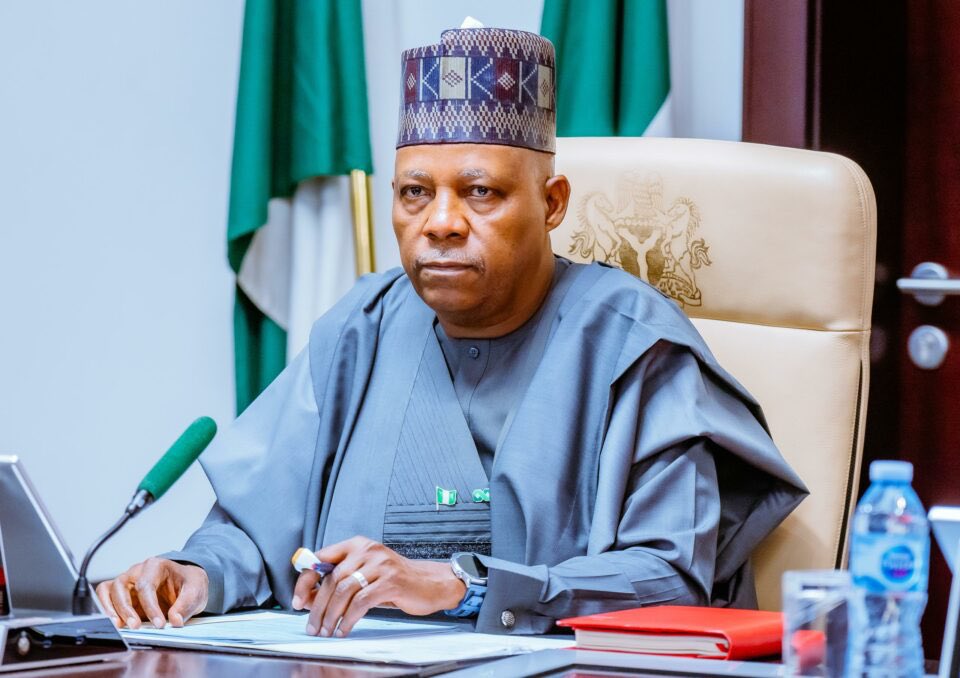Shettima Explains Tinubu’s ‘State of Emergency on Agriculture’ at UN Food Summit in Ethiopia

Vice-President Kashim Shettima has shed light on the rationale behind President Bola Ahmed Tinubu’s declaration of a “State of Emergency on Agriculture”, stating that food sovereignty is central to Nigeria’s national sovereignty and survival.
Speaking at the high-level session titled “Country Perspectives: Government-led Strategies and Regional Framework” during the ongoing UN Food Systems Summit Stocktake in Addis Ababa, Shettima outlined bold strategies by the Tinubu-led administration to combat food insecurity and transform the nation’s agricultural landscape.
The session, which gathered African leaders, development partners, and policymakers, focused on strengthening national food systems and promoting self-sufficiency through inclusive and sustainable policies.
Shettima emphasized that President Tinubu declared the state of emergency out of “genuine concern” for the welfare of Nigerians, especially those affected by conflict in the North-East. According to him, the administration inherited a fragile food security situation, worsened by insurgency and poor agricultural infrastructure.
“We met the nation in a very dire state of affairs,” Shettima stated. “His Excellency, President Bola Tinubu, declared a state of food emergency not for theatrics, but to address the real hunger and suffering among our people, especially in conflict-ravaged areas like the North-East, where Boko Haram has sown seeds of destruction.”
In response, Shettima said the administration established Presidential Food System Coordinating Units—not to replace existing institutions, but to streamline and coordinate efforts across sectors. These units also support food assistance mechanisms, particularly in the North and internally displaced persons (IDP) camps.
The Vice-President praised the efforts of multilateral partners, including the World Food Programme, for their continued support. He highlighted initiatives within IDP camps where displaced persons are being encouraged to grow their food as a means of restoring dignity and building resilience.
“In the Sahelian region, the link between ecology and economy is strong. Hunger does not discriminate,” Shettima warned. “We are committed to empowering smallholder farmers, women, and youths—not through handouts but by building a market-driven agricultural system.”
He stressed that increasing agricultural yields through improved seeds, mechanization, and modern practices is key to the administration’s strategy. Shettima also noted that the government is enhancing extension services to provide real-time data to farmers, helping them adapt to changing climate conditions.
“Our mantra is clear: increase in yield, climate-smart practices, and market-driven solutions,” Shettima concluded. “Entrepreneurial capitalism is part of the Nigerian spirit. We are tapping into that potential to rebuild our food system.”
Also speaking at the summit, United Nations Deputy Secretary-General Amina Mohammed expressed concern over the global malnutrition crisis, noting that over 37 million children under five are facing acute malnutrition this year—almost equal to the population of Canada.
Mohammed urged African leaders to focus on long-term food system reforms rather than relying solely on short-term emergency interventions.
“We must choose transformation over dependency,” she said. “Strong leadership, genuine partnerships, adequate financing, and inclusive planning are critical to achieving food resilience.”
She emphasized the need for coordination and less bureaucracy, calling for efficient systems that directly impact the lives of vulnerable populations.
Other notable speakers at the event included Cindy McCain, Executive Director of the World Food Programme; Salah Jama, Deputy Prime Minister of Somalia; and Moubarack Rounbo, Chad’s Minister of Agricultural Production and Industrialisation.
The UN Food Systems Summit Stocktake continues this week with further discussions on regional collaboration and strategies to accelerate progress toward sustainable food systems across Africa.









